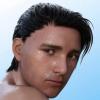How to match skin color of model to anatomical elements?
 daancouzijn
Posts: 53
daancouzijn
Posts: 53
Hey guys,
Does anyone know how I can apply the same skin of my model to the added genitalia?
Post edited by Chohole on


Comments
If the character skin you are using did not come with genetal textures, then you will have to do it yourself in photoshop or gimp. In my experience half the charcaters come with genital textures, the other half don't. You will have to see in the description is they come with the character or not. What skin are you using?
I'm using Keyne for Genesis 8 (Male). I can't tell from the description if it comes with genital textures so I'm guessing it does not. I bought seperate genitals especially for this model but it does say it comes with anatomical elements, I just can't find them. Do I have to have the Genesis 8 Pro Bundle installed to be able to use them?
"Anatomical Elements MATs" means it comes with textures for the genitals. Load you figure with the genitals fitted and then select the figure and apply the texture to the figure, should apply to both. Also it says it has materials for Iray and 3Delight, so make sure you are using the iray ones if the body is iray.
Now if you bought genitals from outside of DAZ3D, meaning renderotica, that is a whole other story since those have differnt ways of applying textures if any.
Yeah, they're from Rendererotica. Could you redirect me to a thread that explains how to apply textures to third party content?
since you are on renderotica as well, there is a product i git from there called Texture Exchanger for G8M Gens. it does a part of the work even if you still have to use gimp/PS - half of the work is done by the script. works well. i don't think the PA has made a new version for G3M tho, no idea.
Thanks! I'll look into it!
Just in case you don't know this (or for users who might not) you may use an image editor to do colour adjustments to a given texture before you actually use the texture on a model, OR you may modified a textured area in the scene after you're done rendering, by circling the part you want to change with the Lasso tool. The latest image editors allow you to soften or "feather" the area being changed so that when you cross the "boundary" it's more of a smooth transition.
If you're going to mess around with a texture that's located in, say... DAZ3D > Runtime > Textures > Artist > "Figure xyz" you'll want to first make a backup, or as your first order of business load the texture (usually a JPEG) and right away, save it back in a lossless format like BMP. If the original file has a name like "xyz-torso" I would start in right off the bat by naming my modified work file "xyz-torso-my-version" or similar.
To get things to "match" or otherwise line up better you'll probably be adjusting the color balance in some way, along with the saturation, the hue and the brightness and contrast. Place the two textures on your screen -- the original and your modified version -- and from there try and get your modified version to match. The RGB color space may seem a bit weird to beginners or folks who are more used to traditional media - for instance there isn't any yellow color per se and the difference between bright white and bright yellows is tricky - white usually wins.
Sometimes it is helpful to take a break or otherwise rest your eyes by looking at something else for a while, and when you come back you'll find it easier to spot differences in color.
Note that DAZ Studio will of course always default to the original version of the texture, so whenever you come back to the figure in question and you wish it to have the modifications you've done in a new scene, you'll have to use the Surface Tool in the Surfaces Pane to make DAZ load and display your modified version.
Once you save your "modified" scene (the version of the scene that calls up your new, modified texture) to disk or SSD then your modifications will always be called up when you load that scene, and if you want the original texture for any reason you simply reverse the process, calling the original up manually and saving the scene back to disk.